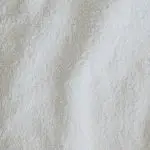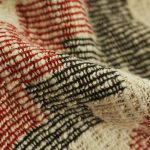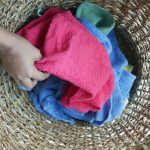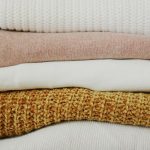When you're considering materials for baby products, terry cloth might catch your attention for its softness and absorbency. It's a favorite for towels and bibs, offering comfort for your little one's delicate skin. But before you make a decision, it's worth looking into both its benefits and potential drawbacks. For instance, while it's durable, improper care can lead to issues like mold and odors. So, how do you balance the advantages with the challenges? Let's explore the factors that could influence your choice.
Table of Contents
Key Takeaways
- Terry cloth is exceptionally soft and absorbent, making it ideal for sensitive baby skin and post-bath comfort.
- It offers durability and functionality but may wear out faster and show pilling with frequent use.
- Careful maintenance is required to prevent mold, odors, and potential shrinkage from high heat drying.
- Compared to other fabrics, terry cloth provides superior absorbency and softness, making it preferable for baby products.
What Is Terry Cloth?
Terry cloth is a soft, absorbent fabric made from loops of cotton or a cotton blend, perfect for keeping your baby cozy and dry. You'll often find it in baby towels, washcloths, and blankets, thanks to its unique texture. The loops create a plush surface that can quickly soak up moisture, making it an ideal choice for bath time or after spills.
This fabric comes in various weights and styles, allowing you to choose the best option for your needs. You might encounter standard terry cloth, which is thicker and more absorbent, or lighter versions that are great for everyday use. When selecting terry cloth products for your baby, always consider the cotton's quality, as softer materials can provide increased comfort for delicate skin.
Terry cloth is also versatile. Not only can it be used in baby products, but it can also be found in adult items like bathrobes and beach towels.
Whether you're looking for a hooded towel for your little one or a soft washcloth for gentle cleaning, terry cloth remains a popular choice among parents for its practicality and comfort.
Benefits of Terry Cloth
The benefits of using terry cloth for baby products are numerous, making it a top choice for parents seeking comfort and functionality. This versatile fabric offers several advantages that can enhance your baby's daily experience.
Softness: Terry cloth is incredibly soft against your baby's delicate skin. It provides a gentle touch, which is essential when you're looking to keep your little one comfortable during diaper changes or bath time.
Absorbency: One of the standout features of terry cloth is its absorbent nature. Whether it's a bib, towel, or washcloth, terry cloth quickly soaks up moisture, ensuring your baby stays dry and cozy. This means fewer chances of rashes or discomfort after baths or spills.
Durability: Terry cloth is built to last. It's resistant to wear and tear, making it a practical choice for the everyday messes that come with parenthood. You'll find that it holds up well after multiple washes, maintaining its quality over time.
Choosing terry cloth for your baby products means prioritizing comfort, functionality, and durability, making your parenting journey a little easier.
Drawbacks of Terry Cloth
While terry cloth has its perks, it's important to consider some drawbacks.
You might find that it doesn't hold up as well over time, leading to wear and tear.
Additionally, if not cared for properly, it can create a breeding ground for mold, which is a concern for baby products.
Limited Durability Over Time
Many parents notice that terry cloth products can wear out faster than expected, leading to concerns about their longevity. If you're relying on these items for your baby, it's essential to be aware of their limited durability. Over time, you might find that terry cloth loses its softness and absorbency, making it less effective for your baby's needs.
Here are three factors that contribute to this issue:
- Frequent Washing: You'll likely wash terry cloth items often, especially when dealing with spills and messes. This can cause the fibers to break down more quickly than other materials.
- Wear and Tear: Daily use can lead to noticeable wear. Whether it's a towel or a bib, constant friction can result in fraying and thinning.
- Pilling: Over time, you may notice pilling on the surface of terry cloth products. This can make them look worn out and less appealing, even if they still function adequately.
Considering these factors, you might want to balance the softness and absorbency of terry cloth with the durability needs of your baby's products.
Potential for Mold Growth
One concern with terry cloth products is their potential for mold growth if they aren't dried properly after use. Since terry cloth is absorbent, it can retain moisture, creating an environment conducive to mold. If you're using terry cloth items like towels or washcloths for your baby, it's crucial to ensure they dry completely after each use.
When you leave them damp or store them in a closed space, you're inviting trouble. Mold can develop quickly, especially in warm, humid conditions. Regular washing is essential, but even that won't help if you don't dry the products thoroughly.
To minimize risks, consider using terry cloth in combination with other materials that dry faster. You might also want to invest in a good drying rack or a well-ventilated area for drying your baby's items.
If you notice any musty odors or discoloration, it's best to discard the item. Keeping an eye on your terry cloth products and ensuring they're completely dry will help maintain a safe environment for your little one. After all, the last thing you want is to expose them to mold.
Comparisons With Other Fabrics
Terry cloth stands out among baby product fabrics for its superior absorbency and softness, making it a popular choice for parents. However, it's essential to compare it with other materials to understand its unique advantages and disadvantages.
Cotton: While cotton is also soft and breathable, it lacks the same level of absorbency as terry cloth. This means you might find yourself needing to change cotton products more frequently during messier moments.
Microfiber: Microfiber is known for its quick-drying properties and lightweight feel. However, it can sometimes irritate sensitive baby skin and may not offer the plush comfort that terry cloth provides.
Bamboo: Bamboo fabric is eco-friendly and has natural antibacterial properties. While it's soft and absorbent, it often comes at a higher price point compared to terry cloth.
Best Uses for Terry Cloth
When you think about baby products, terry cloth stands out for a few key reasons.
It's perfect for bath towels, soft baby bibs, and even absorbent washcloth alternatives.
Let's explore how these features make terry cloth a go-to choice for your little one's needs.
Ideal for Bath Towels
Bath towels made from terry cloth offer exceptional absorbency and softness, making them perfect for wrapping your baby after a bath. You'll appreciate how quickly they soak up moisture, keeping your little one dry and comfortable. Plus, their plush texture feels gentle against your baby's delicate skin.
When choosing terry cloth bath towels, consider these benefits:
- Quick Drying: Terry cloth dries faster than many other materials, which is crucial for maintaining hygiene and preventing mildew.
- Durability: Terry cloth is resilient, holding up well through numerous washes. You won't have to worry about wear and tear after a few uses.
- Versatile Use: Beyond bath time, these towels can be used for wrapping your baby during pool outings or even as a snuggly blanket during cooler weather.
Incorporating terry cloth towels into your baby care routine ensures your child stays warm and cozy after every bath. You'll love the practicality and comfort they bring, making bath time a more enjoyable experience for both you and your baby.
Soft Baby Bibs
Soft baby bibs made from terry cloth offer excellent absorbency and comfort, making mealtime messes a breeze to manage. When your little one dives into their meals, you'll appreciate how well these bibs soak up spills, dribbles, and food splatters. The plush texture is gentle against your baby's skin, ensuring they stay comfortable while they eat.
You can also choose bibs with adjustable snaps or Velcro, making them easy to put on and take off. This feature is particularly convenient during those busy mealtimes. Plus, terry cloth is durable, so you can wash and reuse these bibs without worrying about wear and tear.
Whether your baby's enjoying purees or starting to tackle solid foods, terry cloth bibs can handle it all. They're perfect for everyday use and can even help reduce laundry loads since they contain messes effectively.
You'll find that the softness of terry cloth keeps your baby's neckline dry, preventing irritation. Overall, if you want a reliable and cozy option for mealtime, soft baby bibs made from terry cloth are an excellent choice. You'll love how they make feeding time simpler and mess-free!
Absorbent Washcloth Alternatives
Terry cloth isn't just great for baby bibs; it also makes for superb absorbent washcloth alternatives that can handle everything from bath time to messy clean-ups. Its plush texture and high absorbency make it a go-to choice for various situations in your daily routine.
Here are three best uses for terry cloth washcloths:
- Bath Time: When you're giving your little one a bath, terry cloth washcloths are gentle on their skin and absorb water effectively. They help you clean those hard-to-reach areas without irritation.
- Feeding Messes: Babies can be messy eaters, and terry cloth can soak up spills and drool. Keep a few handy during meal times to wipe faces and hands easily.
- Diaper Changes: During diaper changes, having a soft terry cloth washcloth nearby can help clean up any unexpected messes quickly and comfortably.
With its versatility and softness, terry cloth is a practical alternative you'll find useful in your parenting journey. Plus, it's machine washable, so you can always have a fresh supply ready to go!
Care and Maintenance Tips
To keep your baby's terry cloth products in top condition, regularly wash them in cold water with a gentle detergent. This helps maintain their softness and absorbency while preventing any damage to the fabric.
Avoid using bleach or fabric softeners, as they can break down the fibers over time.
After washing, it's best to air dry your terry cloth items whenever possible. If you choose to use a dryer, opt for a low heat setting to prevent shrinkage. Make sure to remove them promptly to avoid wrinkles and maintain their fluffy texture.
For tougher stains, consider pre-soaking the affected area in a mixture of cold water and a little detergent for about 15-30 minutes before washing. If you notice any lingering odors, try adding a cup of white vinegar to the rinse cycle; it's a natural deodorizer.
Lastly, store your terry cloth products in a dry, well-ventilated area. Avoid damp environments to prevent mildew growth.
With these care and maintenance tips, your baby's terry cloth items will remain soft, safe, and ready for use.
Frequently Asked Questions
Is Terry Cloth Hypoallergenic for Sensitive Baby Skin?
Terry cloth isn't inherently hypoallergenic, but its softness can be gentle on sensitive baby skin. Always choose high-quality, untreated fabrics, and wash them thoroughly to minimize potential irritants that might affect your baby's skin.
Can Terry Cloth Be Used for Baby Clothing?
Yes, you can use terry cloth for baby clothing. It's soft, absorbent, and comfortable against your baby's skin. Just ensure it's pre-washed to prevent any irritation and check for any potential allergens before dressing your little one.
How Does Terry Cloth Compare in Price to Other Fabrics?
Terry cloth typically falls in the mid-range price category compared to other fabrics. It's often more affordable than luxury materials but pricier than basic cotton, making it a reasonable choice for various projects.
Are There Organic Terry Cloth Options Available for Babies?
Yes, you can find organic terry cloth options for babies. Many brands offer organic cotton terry, ensuring a soft, chemical-free fabric for your little one. Just check labels to confirm organic certification before purchasing.
What Colors and Patterns Are Available in Terry Cloth Baby Products?
You'll find terry cloth baby products in a variety of vibrant colors and fun patterns, like polka dots, stripes, and animal prints. These options let you personalize your baby's items while ensuring comfort and style.
- Does Chiffon Fabric Stink - July 15, 2025
- Does Chiffon Fabric Affect the Economy - July 15, 2025
- Does Cotton Fabric Have a Nap - July 15, 2025







